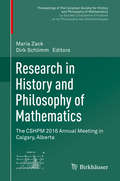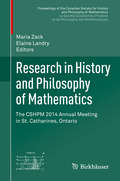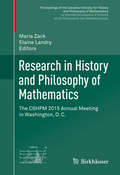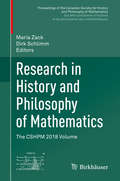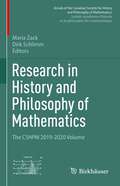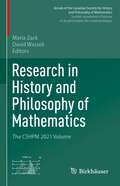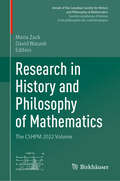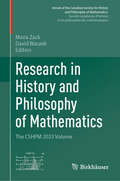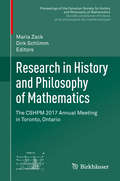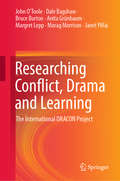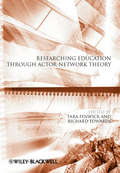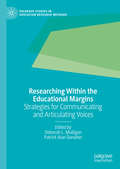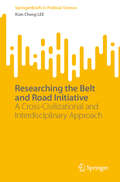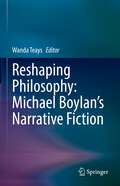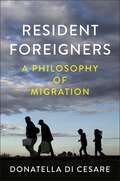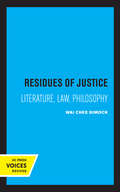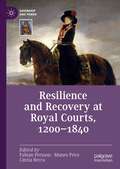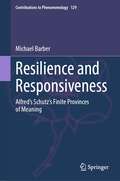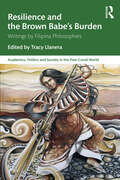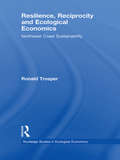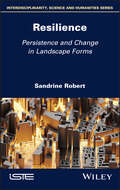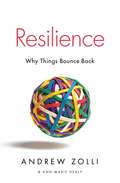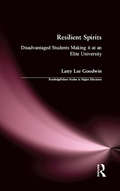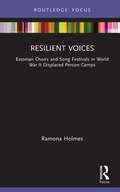- Table View
- List View
Research in History and Philosophy of Mathematics
by Maria Zack Dirk SchlimmThis volume contains seventeen papers that were presented at the 2015 Annual Meeting of the Canadian Society for History and Philosophy of Mathematics/La Soci#65533;t#65533; Canadienne d'Histoire et de Philosophie des Math#65533;matiques, held in Washington, D. C. In addition to showcasing rigorously reviewed modern scholarship on an interesting variety of general topics in the history and philosophy of mathematics, this meeting also honored the memories of Jacqueline (Jackie) Stedall and Ivor Grattan-Guinness; celebrated the Centennial of the Mathematical Association of America; and considered the importance of mathematical communities in a special session. These themes and many others are explored in these collected papers, which cover subjects such as New evidence that the Latin translation of Euclid's Elements was based on the Arabic version attributed to al-Ḥajjāj Work done on the arc rampant in the seventeenth century The history of numerical methods for finding roots of nonlinear equations An original play featuring a dialogue between George Boole and Augustus De Morgan that explores the relationship between them Key issues in the digital preservation of mathematical material for future generations A look at the first twenty-five years of The American Mathematical Monthly in the context of the evolving American mathematical community The growth of Math Circles and the unique ways they are being implemented in the United States Written by leading scholars in the field, these papers will be accessible to not only mathematicians and students of the history and philosophy of mathematics, but also anyone with a general interest in mathematics.
Research in History and Philosophy of Mathematics
by Elaine Landry Maria ZackThis volume contains thirteen papers that were presented at the 2014 Annual Meeting of the Canadian Society for History and Philosophy of Mathematics/La Société Canadienne d'Histoire et de Philosophie des Mathématiques, held on the campus of Brock University in St. Catharines, Ontario, Canada. It contains rigorously reviewed modern scholarship on general topics in the history and philosophy of mathematics, as well as on the meeting's special topic, Early Scientific Computation. These papers cover subjects such as *Physical tools used by mathematicians in the seventeenth century *The first historical appearance of the game-theoretical concept of mixed-strategy equilibrium *George Washington's mathematical cyphering books *The development of the Venn diagram *The role of Euler and other mathematicians in the development of algebraic analysis *Arthur Cayley and Alfred Kempe's influence on Charles Peirce's diagrammatic logic *The influence publishers had on the development of mathematical pedagogy in the nineteenth century *A description of the 1924 International Mathematical Congress held in Toronto, told in the form of a "narrated slide show" Written by leading scholars in the field, these papers will be accessible to not only mathematicians and students of the history and philosophy of mathematics, but also anyone with a general interest in mathematics.
Research in History and Philosophy of Mathematics
by Elaine Landry Maria ZackThis volume contains seventeen papers that were presented at the 2015 Annual Meeting of the Canadian Society for History and Philosophy of Mathematics/La Soci#65533;t#65533; Canadienne d'Histoire et de Philosophie des Math#65533;matiques, held in Washington, D. C. In addition to showcasing rigorously reviewed modern scholarship on an interesting variety of general topics in the history and philosophy of mathematics, this meeting also honored the memories of Jacqueline (Jackie) Stedall and Ivor Grattan-Guinness; celebrated the Centennial of the Mathematical Association of America; and considered the importance of mathematical communities in a special session. These themes and many others are explored in these collected papers, which cover subjects such as New evidence that the Latin translation of Euclid's Elements was based on the Arabic version attributed to al-Ḥajjāj Work done on the arc rampant in the seventeenth century The history of numerical methods for finding roots of nonlinear equations An original play featuring a dialogue between George Boole and Augustus De Morgan that explores the relationship between them Key issues in the digital preservation of mathematical material for future generations A look at the first twenty-five years of The American Mathematical Monthly in the context of the evolving American mathematical community The growth of Math Circles and the unique ways they are being implemented in the United States Written by leading scholars in the field, these papers will be accessible to not only mathematicians and students of the history and philosophy of mathematics, but also anyone with a general interest in mathematics.
Research in History and Philosophy of Mathematics: The CSHPM 2018 Volume (Proceedings of the Canadian Society for History and Philosophy of Mathematics/ Société canadienne d’histoire et de philosophie des mathématiques)
by Maria Zack Dirk SchlimmThis volume contains ten papers that have been collected by the Canadian Society for History and Philosophy of Mathematics/Société canadienne d’histoire et de philosophie des mathématiques. It showcases rigorously-reviewed contemporary scholarship on an interesting variety of topics in the history and philosophy of mathematics from the seventeenth century to the modern era.The volume begins with an exposition of the life and work of Professor Bolesław Sobociński. It then moves on to cover a collection of topics about twentieth-century philosophy of mathematics, including Fred Sommers’s creation of Traditional Formal Logic and Alexander Grothendieck’s work as a starting point for discussing analogies between commutative algebra and algebraic geometry. Continuing the focus on the philosophy of mathematics, the next selections discuss the mathematization of biology and address the study of numerical cognition. The volume then moves to discussing various aspects of mathematics education, including Charles Davies’s early book on the teaching of mathematics and the use of Gaussian Lemniscates in the classroom. A collection of papers on the history of mathematics in the nineteenth century closes out the volume, presenting a discussion of Gauss’s “Allgemeine Theorie des Erdmagnetismus” and a comparison of the geometric works of Desargues and La Hire. Written by leading scholars in the field, these papers are accessible not only to mathematicians and students of the history and philosophy of mathematics, but also to anyone with a general interest in mathematics.
Research in History and Philosophy of Mathematics: The CSHPM 2019-2020 Volume (Annals of the Canadian Society for History and Philosophy of Mathematics/ Société canadienne d’histoire et de philosophie des mathématiques)
by Maria Zack Dirk SchlimmThis volume contains eleven papers that have been collected by the Canadian Society for History and Philosophy of Mathematics/Société canadienne d’histoire et de philosophie des mathématiques. It showcases rigorously-reviewed contemporary scholarship on an interesting variety of topics in the history and philosophy of mathematics, as well as the teaching of the history of mathematics. Topics considered includeThe mathematics and astronomy in Nathaniel Torperly’s only published work, Diclides Coelometricae, seu valvae astronomicae universalConnections between the work of Urbain Le Verrier, Carl Gustav Jacob Jacobi, and Augustin-Louis Cauchy on the algebraic eigenvalue problemAn evaluation of Ken Manders’ argument against conceiving of the diagrams in Euclid’s Elements in semantic termsThe development of undergraduate modern algebra courses in the United StatesWays of using the history of mathematics to teach the foundations of mathematical analysisWritten by leading scholars in the field, these papers are accessible not only to mathematicians and students of the history and philosophy of mathematics, but also to anyone with a general interest in mathematics.
Research in History and Philosophy of Mathematics: The CSHPM 2021 Volume (Annals of the Canadian Society for History and Philosophy of Mathematics/ Société canadienne d’histoire et de philosophie des mathématiques)
by Maria Zack David WaszekThis volume contains eighteen papers that have been collected by the Canadian Society for History and Philosophy of Mathematics. It showcases rigorously-reviewed contemporary scholarship on an interesting variety of topics in the history and philosophy of mathematics, as well as the teaching of the history of mathematics. Some of the topics explored includeArabic editions of Euclid’s Elements from the thirteenth century and their role in the assimilation of Euclidean geometry into the Islamic intellectual traditionPortuguese sixteenth century recreational mathematics as found in the Tratado de Prática Darysmetica A Cambridge correspondence course in arithmetic for women in England in the late nineteenth centuryThe mathematical interests of the famous Egyptologist Thomas Eric (T. E.) Peet The history of Zentralblatt für Mathematik and Mathematical Reviews and their role in creating a publishing infrastructure for a global mathematical literatureThe use of Latin squares for agricultural crop experiments at the Rothamsted Experimental StationThe many contributions of women to the advancement of computing techniques at the Cavendish Laboratory at the University of Cambridge in the 1960sThe volume concludes with two short plays, one set in Ancient Mesopotamia and the other in Ancient Egypt, that are well suited for use in the mathematics classroom.Written by leading scholars in the field, these papers are accessible not only to mathematicians and students of the history and philosophy of mathematics, but also to anyone with a general interest in mathematics.
Research in History and Philosophy of Mathematics: The CSHPM 2022 Volume (Annals of the Canadian Society for History and Philosophy of Mathematics/ Société canadienne d’histoire et de philosophie des mathématiques)
by Maria Zack David WaszekThis volume contains 8 papers that have been collected by the Canadian Society for History and Philosophy of Mathematics. It showcases rigorously reviewed contemporary scholarship on an interesting variety of topics in the history and philosophy of mathematics.Some of the topics explored include:A way to rethink how logic is taught to philosophy students by using a rejuvenated version of the Aristotelian idea of an argument schemaA quantitative approach using data from Wikipedia to study collaboration between nineteenth-century British mathematiciansThe depiction and perception of Émilie Du Châtelet’s scientific contributions as viewed through the frontispieces designed for books written by or connected to herA study of the Cambridge Women’s Research Club, a place where British women were able to participate in scholarly scientific discourse in the middle of the twentieth centuryAn examination of the researchand writing process of mathematicians by looking at their drafts and other preparatory notesA global history of al-Khwārāzmī’s Kitāb al-jabr wa-l-muqābala as obtained by tracing its reception through numerous translations and commentariesWritten by leading scholars in the field, these papers are accessible not only to mathematicians and students of the history and philosophy of mathematics, but also to anyone with a general interest in mathematics.
Research in History and Philosophy of Mathematics: The CSHPM 2023 Volume (Annals of the Canadian Society for History and Philosophy of Mathematics/ Société canadienne d’histoire et de philosophie des mathématiques)
by Maria Zack David WaszekThis volume contains 8 papers that have been collected by the Canadian Society for History and Philosophy of Mathematics. It showcases rigorously reviewed contemporary scholarship on an interesting variety of topics in the history and philosophy of mathematics. Some of the topics explored include: The work of Alfred Clebsch and Adolph Mayer on the theory of the second variation, a topic in the calculus of variations The history of The Analyst – the journal that would eventually become the Annals of Mathematics – and its founding editor, Joel Hendricks An examination of early attempts at introducing transformations into the geometry curriculum at the secondary level Anna Sfard’s commognitive theory of learning and how it can be applied to gain insights into certain aspects of the history of mathematics Analyzing archaeological data from Rapa Nui (Easter Island) and the kinship system of the Natchez tribe of the Mississippi Valley as examples of utilizing ethnomathematics in mathematics education Written by leading scholars in the field, these papers are accessible not only to mathematicians and students of the history and philosophy of mathematics, but also to anyone with a general interest in mathematics.
Research in History and Philosophy of Mathematics: The Cshpm 2015 Annual Meeting In Washington, D. C. (Proceedings Of The Canadian Society For History And Philosophy Of Mathematics/la Société Canadienne D'histoire Et De Philosophie Des Mathématiques Ser.)
by Maria Zack Dirk SchlimmThis volume contains thirteen papers that were presented at the 2017 Annual Meeting of the Canadian Society for History and Philosophy of Mathematics/Société canadienne d’histoire et de philosophie des mathématiques, which was held at Ryerson University in Toronto. It showcases rigorously reviewed modern scholarship on an interesting variety of topics in the history and philosophy of mathematics from Ancient Greece to the twentieth century.A series of chapters all set in the eighteenth century consider topics such as John Marsh’s techniques for the computation of decimal fractions, Euler’s efforts to compute the surface area of scalene cones, a little-known work by John Playfair on the practical aspects of mathematics, and Monge’s use of descriptive geometry.After a brief stop in the nineteenth century to consider the culture of research mathematics in 1860s Prussia, the book moves into the twentieth century with an examination of the historical context within which the Axiom of Choice was developed and a paper discussing Anatoly Vlasov’s adaptation of the Boltzmann equation to ionized gases.The remaining chapters deal with the philosophy of twentieth-century mathematics through topics such as an historically informed discussion of finitism and its limits; a reexamination of Mary Leng’s defenses of mathematical fictionalism through an alternative, anti-realist approach to mathematics; and a look at the reasons that mathematicians select specific problems to pursue.Written by leading scholars in the field, these papers are accessible to not only mathematicians and students of the history and philosophy of mathematics, but also anyone with a general interest in mathematics.
Researching Conflict, Drama and Learning: The International DRACON Project
by Bruce Burton Margret Lepp Morag Morrison John O'Toole Dale Bagshaw Anita Grünbaum Janet PillaiThis book offers a comprehensive and critical guide to research and practice in the field of arts education and conflict management. The DRACON project explores the relationship between drama and conflict transformation. This international, interdisciplinary and comparative action research project, begun in 1996, is aimed at improving conflict management and transformation among adolescent school students using the medium of educational drama.The book reports on the underpinning principles, and on action research practice in Malaysia, Sweden and Australia. The strategies and techniques, which were revolutionary when first introduced, are now tried and tested. The book chronicles the history, successes, opportunities and challenges of the original 10-year project, and brings the story up to date by highlighting some of its many legacies and resulting influences around the world. This book will benefit researchers, academics and graduate students in Education, the Social Sciences, Dispute Resolution and the Performing Arts.
Researching Education Through Actor-Network Theory (Educational Philosophy and Theory Special Issues #31)
by Richard Edwards Tara FenwickResearching Education Through Actor-Network Theory offers a new take on educational research, demonstrating the ways in which actor-network theory can expand the understanding of educational change. An international collaboration exploring diverse manifestations of educational change Illustrates the impact of actor-network theory on educational research Positions education as a key area where actor-network theory can add value, as it has been shown to do in other social sciences A valuable resource for anyone interested in the sociology and philosophy of education
Researching Within the Educational Margins: Strategies for Communicating and Articulating Voices (Palgrave Studies in Education Research Methods)
by Patrick Alan Danaher Deborah L. MulliganThis book explores the challenges and considerations of researchers who work on the educational margins of society. It investigates the diverse and specific research strategies that have been developed to ensure research is authentic, ethical, rigorous, situated and, where possible, empowering. Traversing cutting-edge global research, the chapters demonstrate the effectiveness of specific research methods when researching within educational margins related to particular ‘wicked problems’. Against a backdrop of increasing scrutiny of the conduct of researchers working with marginalised people, this book provides an informed and empowering overview of research methods for those working with marginalised groups.
Researching the Belt and Road Initiative: A Cross-Civilizational and Interdisciplinary Approach (SpringerBriefs in Political Science)
by Kian Cheng LEEThis book offers a cross-civilizational and interdisciplinary approach to the Belt and Road Initiative (BRI) research to mitigate the problematiques of extant literature. Instead of employing conventional lenses of geo-political, geo-economic and geo-strategic analyses that are predominant, this book offers fresh perspectives that venture into other civilizational and disciplinary territories while critically seeking integration without falling into romanticizing or essentializing any notions. Due to epistemic inadequacies and other conceptual limitations of existing approaches, this book argues that a heuristic framework drawing from the negotiation between Western and Chinese perspectives as well as integration of anthropological-international relations conceptualizations can provide greater potency in unravelling the intricacies of BRI studies. This book is a timely contribution to the ameliorating of the rising tensions between US and China over the recent years. An interdisciplinary toolkit for researchers in BRI-related research, as well as those in government organizations, policy-making bodies, think-tanks, trade and industry sectors, the book presents a paradigmatic shift from a predominantly hegemonic Western thinking about the BRI and its role in the region, and within academic dialogue.
Reshaping Engineering Education: Addressing Complex Human Challenges
by Anette Kolmos Fawwaz Habbal Roger G. Hadgraft Jette Egelund Holgaard Kamar RedaThis open access book is dedicated to exploring methods and charting the course for enhancing engineering education in and beyond 2023. It delves into the idea that education, coupled with social connections, is indispensable for a more profound comprehension of the world and the creation of an improved quality of life.The book serves as a conduit for incorporating complex problem-solving into engineering education across various formats. It offers a structured approach for tackling complex issues, comparing an array of techniques for managing complexity within the realm of engineering education. Moreover, the book scrutinizes several complex case studies derived from the United Nation's Sustainable Development Goals. Additionally, it explores intricate problem-solving and curriculum change case studies specific to engineering education from Harvard University, the University of Technology Sydney, and Aalborg University.
Reshaping Philosophy: Michael Boylan’s Narrative Fiction
by Wanda TeaysThis volume offers original essays exploring what ‘fictive narrative philosophy’ might mean in the research and teaching of philosophy. The first part of the book presents theoretical essays that examine Boylan’s recent books: Teaching Ethics with Three Philosophical Novels and Fictive Narrative Philosophy: How Literature can Act as Philosophy. The second and third part offer essays on how Boylan executes his theory in the practice within his novels from his two series De Anima and Archē. The book clearly shows the unique aspects of the fictive narrative philosophy approach. First, it makes story-telling accessible to wide audiences. Second, story-telling techniques invoke devices that can set out complicated existential problems to the reader that offer an additional approach to thorny problems through the presentation of lived experience. Third, the discussion of these devices is a way to explore philosophical problems in a way that many can profit from. The book concludes with an essay in which Boylan responds to the critical challenges set out in Part One and the practical criticism set out in Parts Two and Three. Boylan addresses the key claims made by his objectors and defends his position. He engages with the authors in the way his theory is matched against his actual novels. This is useful reading for both philosophers and professors of literature teaching introductory as well as upper-level courses in the fields of philosophy, literature and criticism.
Resident Foreigners: A Philosophy of Migration
by Donatella Di CesareFrom the shores of Europe to the Mexican-US border, mass migration is one of the most pressing issues we face today. Yet at the same time, calls to defend national sovereignty are becoming ever more vitriolic, with those fleeing war, persecution, and famine vilified as a threat to our security as well as our social and economic order. In this book, written amidst the dark resurgence of appeals to defend ‘blood and soil’, Donatella Di Cesare challenges the idea of the exclusionary state, arguing that migration is a fundamental human right. She develops an original philosophy of migration that places the migrants themselves, rather than states and their borders, at the centre. Through an analysis of three historic cities, Athens, Rome and Jerusalem, Di Cesare shows how we should conceive of migrants not as an other but rather as resident foreigners. This means recognising that citizenship cannot be based on any supposed connection to the land or an exclusive claim to ownership that would deny the rights of those who arrive as migrants. Instead, citizenship must be disconnected from the possession of territory altogether and founded on the principle of cohabitation – and on the ultimate reality that we are all temporary guests and tenants of the earth. Di Cesare’s argument for a new ethics of hospitality will be of great interest to all those concerned with the challenges posed by migration and with the increasingly hostile attitudes towards migrants, as well as students and scholars of philosophy and political theory.
Residues of Justice: Literature, Law, Philosophy
by Wai Chee DimockThis title is part of UC Press's Voices Revived program, which commemorates University of California Press’s mission to seek out and cultivate the brightest minds and give them voice, reach, and impact. Drawing on a backlist dating to 1893, Voices Revived makes high-quality, peer-reviewed scholarship accessible once again using print-on-demand technology. This title was originally published in 1996.
Resilience and Recovery at Royal Courts, 1200–1840 (Queenship and Power)
by Cinzia Recca Munro Price Fabian PerssonThis book demonstrates the evolution of resilience and recovery as a concept by applying it to a new context, that of courts and monarchies. These were remarkably resilient institutions, with a strength and malleability that allowed them to ‘bounce back’ time and again. This volume highlights the different forms of resilience displayed in European courts during the medieval and early modern periods. Drawing on rarely published sources, it demonstrates different models of monarchical resilience, ranging from the survival of sovereign authority in political crisis, to the royal response to pandemic challenges, to other strategies for resisting internal or external threats. Resilience and Recovery illustrates how symbolic legitimacy and effective power were strongly intertwined, creating a distinct collective memory that shaped the defence of monarchical authority over many centuries.
Resilience and Responsiveness: Alfred’s Schutz’s Finite Provinces of Meaning (Contributions to Phenomenology #129)
by Michael BarberThis book extends Alfred Schutz’s “On Multiple Realities” by describing the provinces of meaning of play, music, religious ritual, and African-American folkloric humor. Throughout these provinces, the author traces two themes: resilience and responsiveness. In resilience, individuals or communities run up against obstacles, imposed relevances, which they come to terms with, or give meaning to (in phenomenological parlance), by modifying, evading, overcoming, or accepting them. Responsiveness emerges from Schutz’s idea of making music together, which the author takes further by analyzing the mimetic encounter with the other and the asymmetries in listening to music, and, especially, by showing how the features of the cognitive style of music as a province of meaning affect sociality, disposing us to be more vulnerable and attentive to each other’s non-conceptual, musical meanings. This text appeals to upper-level undergraduate students and graduate students as well as to faculty in philosophy.
Resilience and the Brown Babe’s Burden: Writings by Filipina Philosophers (Academics, Politics and Society in the Post-Covid World)
by Tracy LlaneraThis volume examines the concept and practice of resilience from the perspective of Filipina philosophers. It investigates the double-edged nature of resilience and other key assumptions and ideas about human resilience and resilient cultures and institutions. The chapters in the collection are intersectional in approach, drawing from feminist theory, social and political philosophy, critical theory, pragmatism, virtue theory, social epistemology, and decolonial theory in their engagement of the theme. Part of the Academics, Politics and Society in the Post-Covid World series, the book will be of interest to scholars and students of philosophy, political theory, feminist theory, philosophy of education, cultural studies, and development studies. It will be valuable to academics in Philippine Studies, Asian and Southeast Asian Studies, and Global South Studies.
Resilience, Reciprocity and Ecological Economics: Northwest Coast Sustainability (Routledge Studies in Ecological Economics)
by Ronald TrosperHow did one group of indigenous societies, on the Northwest Coast of North America, manage to live sustainably with their ecosystems for over two thousand years? Can the answer to this question inform the current debate about sustainability in today’s social ecological systems? The answer to the first question involves identification of the key institutions that characterized those societies. It also involves explaining why these institutions, through their interactions with each other and with the non-human components, provided both sustainability and its necessary corollary, resilience. Answering the second question involves investigating ways in which key features of today’s social ecological systems can be changed to move toward sustainability, using some of the rules that proved successful on the Northwest Coast of North America. Ronald L. Trosper shows how human systems connect environmental ethics and sustainable ecological practices through institutions.
Resilience: Persistence and Change in Landscape Forms
by Sandrine RobertThe articulation between persistence and change is relevant to a great number of different disciplines. It is particularly central to the study of urban and rural forms in many different fields of research, in geography, archaeology, architecture and history. Resilience puts forward the idea that we can no longer be truly satisfied with the common approaches used to study the dynamics of landscapes, such as the palimpsest approach, the regressive method and the semiological analysis amongst others, because they are based on the separation between the past and the present, which itself stems from the differentiation between nature and society. This book combines spatio-temporalities, as described in archeogeography, with concepts that have been developed in the field of ecological resilience, such as panarchy and the adaptive cycle. Thus revived, the morphological analysis in this work considers landscapes as complex resilient adaptive systems. The permanence observed in landscapes is no longer presented as the endurance of inherited forms, but as the result of a dynamic that is fed by this constant dialogue between persistence and change. Thus, resilience is here decisively on the side of dynamics rather than that of resistance.
Resilience: Why Things Bounce Back
by Ann Marie Healy Andrew ZolliDiscover a powerful new lens for viewing the world with fascinating implications for our companies, economies, societies, and planet as a whole.What causes one system to break down and another to rebound? Are we merely subject to the whim of forces beyond our control? Or, in the face of constant disruption, can we build better shock absorbers—for ourselves, our communities, our economies, and for the planet as a whole? Reporting firsthand from the coral reefs of Palau to the back streets of Palestine, Andrew Zolli and Ann Marie Healy relate breakthrough scientific discoveries, pioneering social and ecological innovations, and important new approaches to constructing a more resilient world. Zolli and Healy show how this new concept of resilience is a powerful lens through which we can assess major issues afresh: from business planning to social development, from urban planning to national energy security—circumstances that affect us all. Provocative, optimistic, and eye-opening, Resilience sheds light on why some systems, people, and communities fall apart in the face of disruption and, ultimately, how they can learn to bounce back.
Resilient Spirits: Disadvantaged Students Making it at an Elite University (RoutledgeFalmer Studies in Higher Education)
by Latty Lee GoodwinThis study explores the identity construction of socioeconomically and educationally disadvantaged students who enter an elite university. This critical ethnography gathered qualitative data about the twenty-three participants through non-participant observation, in-depth interviews, and focus groups. Faculty, staff, and administrators were also interviewed.
Resilient Voices: Estonian Choirs and Song Festivals in World War II Displaced Person Camps
by Ramona HolmesThe aftermath of World War II sent thousands of Estonian refugees into Europe. The years of Estonian independence (1917-1940) had given them a taste of freedom and so relocation to displaced person (DP) camps in post-war Germany was extremely painful. One way in which Estonians dealt with the chaos and trauma of WWII and its aftermath was through choral singing. Just as song festivals helped establish national identity in 1869, song festivals promoted cultural cohesiveness for Estonians in WWII displaced person camps. A key turning point in hope for the Estonian DPs was the 1947 Augsburg Song Festival, which is the center point of this book. As Estonian DPs dispersed to Australia, Canada, Europe, and the United States these choirs and song festivals gave Estonians the resilience to retain their identity and to thrive in their new homes. This history of Estonian WWII DP camp choirs and song festivals is gathered from the stories of many courageous individuals and filled with the tenacious spirit of the Estonian singing culture. This work contributes to an understanding of immigration, identity, and resilience and is particularly important within the field of music regarding music and healing, music and identity, historical musicology, ethnomusicology, and music and politics.
